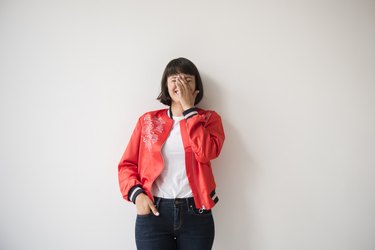
Ever felt embarrassed and tried to save face, but your cheeks begin to warm and turn red? And then you blush more because you're even more embarrassed that you're blushing? If you're prone to blushing, you might be wondering why it happens so easily for you and seemingly not for others.
Blushing is a common automatic fight-or-flight nervous system response in people who experience anxiety, says Tracy Dennis-Tiwary, PhD, professor of psychology and author of Future Tense: Why Anxiety is Good For You (Even Though it Feels Bad).
Video of the Day
Video of the Day
It occurs when the hormone adrenaline is released, which causes blood vessels to widen to increase blood flow and oxygen circulation. This means that more red blood cells are traveling to the surface of your skin, giving you that red color.
Don't confuse blushing with being flushed. The responses are the same physiologically, but feeling flushed is generally associated with exercise and the increase of body temperature, while blushing is associated with our emotions, Murdoch University psychology professor Peter Drummond, PhD, tells LIVESTRONG.COM. Being flushed cools down your body's temperature and blushing cools you down after feeling a strong emotion.
While blushing can be an annoyance for some, there's an evolutionary reason for it: Blushing serves as a signal that communicates your wish to remain in good faith with people and that you care about their opinions of you, says Milica Nikolić, PhD, social and behavioral sciences professor at the University of Amsterdam. When our social status is at stake, we blush as a way to apologize.
"Socially anxious people blush more easily because they're more concerned about how they look in the eyes of others." Nikolić says.
Blushing is something you shouldn't be ashamed of or worry about. But, if you feel like it happens often, here are some potential causes to look out for, plus strategies to address them.
1. You're More Self-Conscious
If you're meeting someone for the first time, going to a job interview, giving a presentation or experiencing a situation where you may feel scrutinized or looked at, it may cause you to blush.
"I think this is related to how sensitive we are to others' opinions of us," Nikolić says. "So people who are, for example, very anxious and concerned about how other people will evaluate them, and think, 'What do they think about me? What will they say about me?' Then they also blush more easily."
2. Your Skin Is Lighter
Blushing is more visible for people who are of a lighter complexion compared to a darker complexion, Drummond says.
3. You Have More Estrogen
Higher levels of estrogen might be the reason for your rosy cheeks. "Blushing will often be stronger in women than in men,"' Drummond says. "This may be linked with menstrual cycle hormones."
In fact, according to a small June 2015 study in Psychoneuroendocrinology, people who menstruate may get redder in the face at different points in their cycles when estrogen is high. This may be because estrogen makes blood vessels dilate more, Drummond says, bringing more red blood cells to the skin.
What to Do if You Blush Easily
Blushing is completely common and an instinctual response to an uncomfortable environment. "You can't really stop the physiological process in any simple way," Drummond says.
But preparing for certain situations beforehand with techniques like mindfulness practices can help, Nikolić says, citing her May 2020 research in Current Psychiatry Reports.
"Managing anxieties before and during an anxiety-provoking event, like relaxation and breathing techniques that reduce physiological arousal, can help," Dennis-Tiwary adds.
In extreme cases, people will control blushing by taking beta-blockers, medications typically used for high blood pressure, to stop the adrenaline that would turn your skin red, Dennis-Tiwary says.
If blushing is affecting your quality of life, you may want to speak to a doctor to discuss treatment if needed.
Otherwise, try your best to accept that you blush easily — and remember it's not all bad: When people blush, others view them more positively, according to older April 2011 research in Emotion. They're seen as more trustworthy and likable.
Is this an emergency? If you are experiencing serious medical symptoms, please see the National Library of Medicine’s list of signs you need emergency medical attention or call 911.